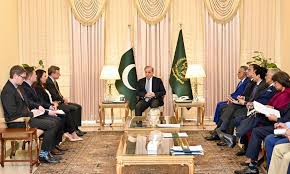G7 chair Italy assumes new importance in West

Rome: Prior to becoming Italian prime minister in 2022, there were widespread reservations in the West about Giorgia Meloni’s suitability for high office. However, her foreign policy actions so far, including her strong support for Ukraine, have surpassed initial expectations in key Western capitals.
The latest indication of this will come on Friday with Meloni’s trip to North America to see US President Joe Biden and Canadian Prime Minister Justin Trudeau, partly in her capacity as chair of the G7 in 2024. She will get a warm welcome in both Washington and Toronto, despite her previous spats with Trudeau.
Top of the billing is Meloni’s White House meeting. She has built up a good relationship with Biden, who initially had significant concerns about her far-right political roots.
She has more than surpassed his expectations with her strong support for Ukraine, despite Italian public opinion being more sympathetic to Russia than much of the rest of Europe. The US president is also aware that, within Rome, anti-establishment political parties like The League — which forms part of the government coalition — had, prior to the Ukraine conflict, sought a reevaluation of Italy’s relationship with Moscow, including calling for the lifting of pre-2022 EU sanctions.
However, on Saturday, the second anniversary of the start of Russia’s invasion, Meloni chaired the first meeting this year of the G7 leaders. This meeting confirmed their strong unity in support of Kyiv, as well as their determination to continue providing Ukraine with assistance and to strengthen sanctions against Moscow and any entities that allow sanctions to be circumvented.
Meloni has built up a good relationship with Biden, who initially had significant concerns about her far-right political roots
Meloni also declared that one priority of this year’s G7 will be “working on the reconstruction of Ukraine as a way to bet on a future of peace, freedom and Euro-Atlantic prosperity for this nation.” Moreover, she asked that the Russian authorities shed light on the circumstances surrounding the death of Alexei Navalny, while condemning the repression of political dissidents in Russia.
Beyond Ukraine, Meloni has also moved to terminate Rome’s membership of the Chinese Belt and Road Initiative. Italy’s 2019 decision to join this huge infrastructure scheme sent shock waves across the Western world, as it became the first (and so far only) member to sign up under the administration of then-Prime Minister Giuseppe Conte. This produced a strong rebuke from the Trump administration, with Garrett Marquis, the US National Security Council spokesman at the time, asserting that there was “no need for the Italian government to lend legitimacy to China’s infrastructure vanity project.”
The rationale for U-turning on this issue is not just related to Western security. In addition, there is little evidence that Italy has economically benefited from the deal. Over the last four years, Italian exports to China have risen only modestly, to about €16.4 billion ($17.7 billion dollars) in 2022 from a baseline of €13 billion in 2019.
While Italy is not always seen as a top-tier global power, the reason Biden cares so much about the Rome-Washington relationship is the former’s continued systemic importance in Europe and the wider West. This includes its chairing of the G7 during this critical year, with the conflict in Ukraine still underway and key elections taking place in multiple nations, including Russia, the US and the UK.
Italy’s structural importance in the West is also illustrated by the fact that it is the third-largest eurozone economy and it poses perhaps the biggest threat to the single currency area’s future. This is because the country has the second biggest debt load in the eurozone at well over 100 percent of gross domestic product and its banking sector is under significant stress, with massive underperforming loans.
The attractiveness of Canada to the EU on the green front goes well beyond its hydrogen capabilities
In Canada, the agenda is economic as well as strategic. Italy and the 27 EU member states in general see in the vast North American country a huge partnership opportunity to help them diversify supply chains, especially on natural resources and green technologies, in the wake of the Ukraine war.
Late last year, the two powers announced a new Green Alliance. This is the most comprehensive form of bilateral engagement established under the European Green Deal.
One example of Canadian-EU partnership is hydrogen. In Atlantic Canada, for instance, a growing number of companies are vying to build massive wind-powered plants with the goal of transporting hydrogen, in the form of ammonia, to Europe, where there is a significant market for greener energy.
Hence the importance of the new Green Alliance, which also helps with the European goal of diversifying from the Chinese and Russian economies. Canada is one of the key Western allies that the EU would like to build stronger green economy supply chains with, including critical raw materials, to help ensure the secure and sustainable supply of materials for Europe’s industry.
So, the attractiveness of Canada to the EU on the green front goes well beyond its hydrogen capabilities. There are also plans for much greater cooperation in areas like carbon pricing and trading. In the example of carbon pricing, both Canada and the EU have a shared interest in rolling out carbon markets internationally. Europe has announced it will become a partner of Trudeau’s Global Carbon Pricing Challenge, which seeks to increase the explicit carbon pricing coverage of global emissions to 60 percent by 2030.
Meloni’s important trip therefore has a significant economic dimension, but it will be strategic issues that dominate. Top of the list will be Ukraine amid growing Western concern about the course of the conflict, especially following recent Russian battlefield gains.





